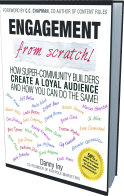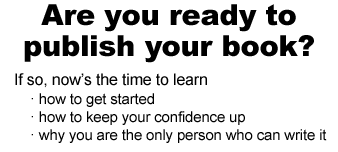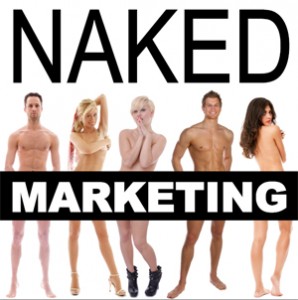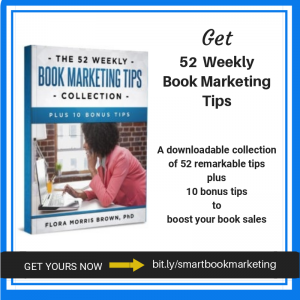It was my pleasure to interview Danny Iny, profilic blogger and teacher in the Firepole Marketing Training Program. He has distinguished himself as an entrepreneur, marketer and author. His work, The Naked Marketing Manifesto, has resonated with entrepreneurs and marketers across the Internet. He’s especially excited to be the co-author, with Guy Kawasaki, Brian Clark, Mitch Joel, and a lot of other people you’d recognize, in Engagement from Scratch!: How Super-Community Builders Create a Loyal Audience, and How You Can Do the Same!
Enjoy the highlights of our interview below or if you prefer to listen to the full unedited interview, click the audio button immediately below:
Entrepreneurship is a high impact activity
Q: In one of your articles, you said that “There are days when I wish that entrepreneurship wasn’t such a high-impact activity.” Would you explain what you mean by that? And then along with that, share what milestones and setbacks have gotten you to where you are right now?
A: Sure. So that was in a post I wrote that was– it was a really a pivotal point in my life. I had just finished my MBA and at that pretty much like exactly the same time, I found that the job that I wanted that was the reason why I did the MBA didn’t count up. So it was very frustrating. It was a very kind of pivotal point for me. It all worked out very well because in a hindsight, if I had taken that teaching position, or I should say if I’ve gotten that teaching position, I wouldn’t be able to do all the things I’m doing with Firepole Marketing. So things worked out.
But what else it kind of alluding to is that it’s a lot like, well like a high-impact sport like I come from a martial arts background so something like ultimate fighting or whether it’s Olympic training of any kind that you really got to be fully committed and give it your all. There is no–– you can’t just do it as a hobby kind of for fun. You’re either in or you’re not. And sometimes, it’s still no mat–– even though you give it your all, you’re going to get kicked in the teeth and you’re going to fall down and it’s not going to be pleasant. And that’s just the nature of the game. But you pick yourself back up and you keep on going.
And I have had my fair share of setbacks and there is this whole MBA leading to not getting the job experience, there was–– I ran a start-up company in 2007, 2008 called MaestroReading, reading software, teaches kids how to read. And I was young and I was inexperienced and the timing was very bad in terms of what happened with the markets. And all that together just destroyed the business and I got stuck with forced to having to let all my employees go and I got stuck with a lot of personal debt. So I definitely had my share of setbacks.
But you see them all as learning experiences. You learn something. You keep on going. And it gets you better equipped to do better with the next thing that you try. And more recently, things have been just going spectacularly well and we’ve been breaking milestone after milestone with Firepole Marketing and with my business.
Danny convinces parents to let him drop out of high school to become entrepreneur
Q. What did you do and say that finally convinced your parents to support you in this decision? I’m just trying to imagine what it would be like if I had my kids made that decision.
That’s a great question and I absolutely have to say I can’t take all the credit for this experience fact that I have. Broad-minded parents certainly allowed me to do a lot of the things and empowered me to do a lot of the things that I ended up doing. The back story to that whole kind of a decision was that I was your stereotypical, goody two-shoes little kid up until about the 7th or 8th grade. I was every teacher’s favorite students. I was the one who had his homework all done before he went home kind of thing, like that was me.
And then I got into the 9th grade and suddenly, I don’t know what switched, but I was just so bored. I was just not enjoying and not interested in anything that was being covered and I thought it was just moving so slowly. And I started cutting a lot of classes. And I, overnight, almost I kind of went from this goody two-shoes [to missed 152 classes.]
. . .it was a downhill from there.
.. . when I . . .actually told my parents, “This is what I’m going to do,” my mom. . . saw that I was actually was going to be doing something with my time and she was fine with it. She was very supportive and she’d had her own experience in high school and she didn’t consider it to be a highly valuable use of time
[My mom] also [said] “Oh, look, I mean, worst case–– worst comes to worst, I really want it so you spending a year in night school and you get a high school diploma. It’s like your opportunity cost here is not actually that grade. If . . . you absolutely realize you need that high school diploma, you just go back and get one.”. . .My dad was much more skeptical and it was–– it was quite a leap of faith on his part and I’m sure he lost a lot of nights’ sleep doing it.
. . .it’s really important for anyone who’s listening to this, do I think high school is a valuable experience? Not really, to be perfectly honest, but I’m not saying everyone should then pick up and quit school. I’m saying that I would encourage them to do so if they can think of something better to do with their time and only at that point.
Is Danny an entrepreneur, teacher or writer?
Q. Do you see yourself as an entrepreneur, a teacher, or a writer first?
A. That’s a really interesting question, and I would say that I see myself as all three but in different ways.
So entrepreneurship is kind of what I do. Teaching is almost the skill set that I bring to there in a lot of the business stuff that I do. And as for writing, writing is actually not significantly different, in my opinion at least, from teaching.
I’m good at communicating that to other people and weigh the two softly down, well that’s all that writing really is. And I think writing, it’s something I’m very good at. It’s a skill set that I have developed and I have always been comfortable with to a certain extent. But I don’t–– I don’t see myself as a writer, kind of like someone who, I don’t know, spends a lot of their time working on the phone and in conversations as part of their work. They don’t see themselves as a professional conversationalist. It’s just it’s–– it’s part of the job, right. It’s part of how you do it.
What is the benchmark of good writing?
A. I’ll tell you how I determine what makes writing good, and the way I know that I have written something and I have done a good job is when people read it and they say, “This sounds just like you.”
That’s how I know if you have done a good job with this. Good writing, if you wanted it to be really good writing, imagine just sitting across from a good friend, having a cup of coffee, having a beer maybe, you’re sitting down, you’re having a conversation, and I asked you a question. And you’re explaining it. You’re answering their question, or you’re sharing an idea. And the way you write minus the um’s, uh’s, or that’s kind of stuttering, minus all that, what you write should sound exactly like what you would say to your friend. And if at the end of the conversation your friend gets it, then you’ve done a good job.
How Danny became the Freddy Krueger of Blogging
Q. You’ve become the Freddy Krueger of Internet. Would you share how you got that moniker and what led you to start using it in your marketing?
A. Yeah, sure. So first of all the important thing to say is I did not come up with this. This was not originally my idea. I started–– one of the–– one of the early tactics that I used to grow my audience with Firepole Marketing was guest posting. So I did a lot of guest writing for other blogs and I quickly found that the more writing you do and the more that writing is concentrated in a short time frame, the more likely it is for people to notice you which is just–– it makes sense if you think about it, right. If they see you on three places in a week, they’re more likely to notice yo
And so I started doing that intentionally, like kind of writing a lot of posts in waves. I’m trying to pile those and go up at the same time. And people started to notice. And this guy, Eugene who’s–– he’s actually has become a friend. We talked on the phone every so often. Eugene Farber over at Content Strategy Hub, he blogs out of New York, he had started even calling[ me] names on some of his post saying, “Wow Danny! It’s like your Freddy Krueger, wherever I turned, you’re there.”
And it just kind of stuck and I found out–– and this is for everyone who’s listening. Pay attention to this because this is important.
One of the most important things that has contributed to my success is paying attention. You can look like a genius. If you just pay attention and notice good ideas when they happen around you and it’s amazing how much credit I get for coming up with brilliant stuff when really all I’m doing is just noticing somebody else’s good idea and applying it.
And so he [Eugene] said this a couple of times and I noticed, “Okay, there was a resonance.” It’s memorable. It kind of–– it captures–– for anyone who’s familiar with my story, it kind of captures it all.
And so I ran with it. I wrote a blog post saying “How I became the Freddy Krueger of blogging” and it just kind of stuck.
Danny talks about the Naked Marketing Manifesto
Q: Which product are you the most proud of the things you’ve done lately?
A. Oh, I’m very excited about what’s happening with the Naked Marketing Manifesto. So for those who haven’t read it, I’ll, I’ll–– or who don’t know what it is, I’ll share with you some of the back story on this
The Naked Marketing Manifesto is short and it’s important to stress that it’s short. It’s 42 small pages with pretty large print and I wrote this thing because I felt that marketing has really gotten too complicated. It’s been made to be way more complex than it has to be. If you do a Google search, I don’t remember if the numbers out there are like billions and billions of results about marketing. There are hundreds of thousands of books about it. And yet if you sit down with any set of experts and ask them, “What is the number one go-to starting point book about marketing?”, it’s really hard for them to bring something up. There’s a lot of–– if you want a book about, the right book about buzz marketing, or the right book about copywriting, or the right book about whatever niche, they’ll have one.
But what is the book to start about marketing? It’s like it’s so fragmented and there is none. There is none that a lot of experts could agree on, and I’d like to think that if there’s a list of experts, I’m probably somewhere on that list and I’ve asked a lot of my colleagues and nobody could really come up with what is that one book. And so I wrote this Manifesto with the intention of just making marketing simpler. Marketing is fundamental. It’s just about aligning what you’ve got with what people want and I’m telling you about it, that’s all there is to it.
And so over those 42 small pages of large print, I used the metaphor of an intimate relationship to explain how to go through the process of doing that. And so I just put together the Manifesto. I spent maybe 3 or 4 months doing it. It was quite a lot of work but it was–– I think it was worth it. I put this thing together and I put it online. I made it available for free. It’s–– so you don’t even need to opt in with the name or email address. Just go to NakedMarketingManifesto.com and you either tweet or share on Facebook in order to grab it.
And the responses have just blown me away. It’s in the last month since I released that, it’s been downloaded and shared several thousand times. A couple of dozen pieces of companion material were written and created by the community. They were viewed in combination over 15,000 times. There have been reviews. There have been feedbacks. The response has just been phenomenal and to the point that I’m realizing, “Okay, there is this appetite or there is demand, then maybe I should write a book about it.”
Danny makes plan to turn manifesto into book
A: So I’ve turned around, I’ve asked my audience “Is this something that you like me to do?” And the response has been yes. And what I’m doing now and I don’t want to spill the beans just yet, I’m kind of going to make out an announcement this evening actually. So I guess it will be a little while ago when you are listening to this.
But I’m just about to share how I’m going to go about writing because it’s very important to me that if I write this, it’d not be just another marketing book to sit on the shelf. It’s going to be something that is truly amazingly valuable. And what I can say is that the way the books are conventionally written, that isn’t likely to happen.
Because how books are usually written: the author has an idea about what to write and hopefully that idea is based on market demand and stuff that he’s–– the author has seen that’s something people want. And that’s the case here. I have seen that people like this idea. Okay, great. So the author then goes away to write in seclusion in, I don’t know, a cabin in the woods or something.
They write their book and after six months, they come back with the book that is their best guess at what their best understanding was of the market demand six months ago. And there’s often quite a mismatch between what they end up writing and what the market actually needs. And so that’s what I don’t want to do and I think I’ve come up with a really interesting way of doing things differently.
Find out how Danny is writing his book very differently here.
Danny believes everyone needs a teacher
A: . . .everyone needs a teacher and that comes back to the importance of these gifted teachers that are out there. Many of them are in schools, many of them are not. But people need teachers which is why if you have something to offer, and this applies to every listeners, then you have responsibility to share it. And if you need help, you have responsibility to find the teacher who can–– who can provide it.
Danny’s advice on getting to work with celebrities
Q: What advice do you have for those of us who want to eventually get to be in the Guy Kawasaki circle or we want to be able to collaborate or work with these people. What is your advice for getting into the celebrity circle?
A. I never think of people as celebrities and I am not interested in working with celebrities. I am interested in working with people that have something of substance to offer.
If you want to work with someone like Brian Clark or Guy Kawasaki, then you’ve got to maneuver the situations so that you have something to bring to the table that Brian Clark or Guy Kawasaki will be happy to out their names on.
Grab Danny’s works free, then let him know what you think about them
NakedMarketingManifesto.com and EngagementfromScratch.com










